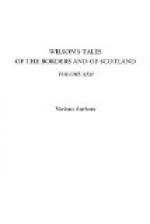This hope, which was nothing more than despair in hysterics, enabled Dewhurst to withstand, for a little, the looks of triumph in Hamilton and Cameron, in spite of their laugh, which still rung in his ears. The sermon had touched him but little, and if he could have got quit of this wildly contracted debt, he would likely be the same man again. He did not, as yet, feel even the dishonour of having taken advantage of the boy’s statement—an act which he had subtlety enough to defend. Give him only relief from this debt, the fire of the club, the stabbing glances of Hamilton’s eye. At least he was not bound to suffer the personal expression of his companions’ triumph any longer than he could away.
“We will wait the issue of Campbell’s inquiry,” he said with affected calmness. “I have a call to make in the Links.”
And he was retreating, even as he uttered these words.
“I owe you L5,” cried Hamilton, “which, as a man of honour, I pay you to-night at seven o’clock, upon the instant, at Stewart’s. I have no wish to be dragged before the club.”
With this barb, touched with wararra poison, or ten times distilled kakodyle, and a layer of honey over all, Dewhurst hurried away, to make no call. He was hard to subdue, and a puppy, whose passion it was to strut, in the perfection of a refined toilette, among fashionable street-walkers. While he was abroad, his cares rankling within were overborne by the consciousness of being “in position.” The dog’s nose is cold even when his tongue is reeking; and as he walked slowly along, his exterior showed the proper thermo-metric nonchalance—it was not the time for a pyrometric measurement within the heart. On his way, he talked to a Leith merchant, who hailed him; yet he exhibited the required retenu, so expressive of confidence and ease within, and withal so fashionable. You might have said that he had the heart to wing a partridge,—to “wing it,” a pretty phrase in the mouth of a polite sportsman, who, if a poacher were to break the bones of his leg, would, in his own case, think it a little different. Yes, Dewhurst might have been supposed to be able to “wing a partridge,”—not to “flay a gull.”
It was while thus “in position”—not its master, but its slave—that curvation of the spine of society, which produces so much paralysis and death—that, when he came to Princes Street, he felt himself constrained and able to walk up South St. Andrew Street, direct to the door of the Royal Bank. He even entered; he even drew a draft; he even made that draft L110, all the money he had there in keeping for so many coming wants and exigencies; he even presented it to the teller, who knew his circumstances and his dangers—ay, and his father’s anxieties while he sent the yearly remittance.
“All, Mr. Dewhurst?” said the teller, looking blank at the draft.
“All, sir; I require it all,” answered the student, with such a mouthful of the vowel, that we might write the word requoire, and not be far from the pronunciation.




